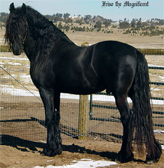Like you and I, horses also depend on having strong, healthy joints to maintain an active lifestyle. Joint health is a vital part of a healthy horse. A joint is formed when two or more bones come together. They have many important jobs including allowing limbs to bend, absorbing the shock of motion, and providing stability and movement. Healthy joints allow horses to move freely and easily. A horse’s joints can easily be damaged if not taken care of properly, which is why it is important to actively support your horse’s joint health, so your horse can live a long and healthy life.
Horses have three types of joints: synovial, fibrous, and cartilaginous. The fibrous and cartilaginous joints both have limited movement and aren’t likely to be affected by disease or injury. The fibrous joints are located in the skull, as well as between some longer bones, while the cartilaginous joints can be found in the pelvis, growth plates, and vertebrae. The synovial joint, however, is the most important, and most common of all the joints, because it assists horses with movement and stability. These joints are found in various areas such as the hips, knees, and elbows.
A horse’s forelegs bear 60-65% of its weight when moving at a high speed, which makes leg injuries extremely common in horses. Your horse depends on having healthy joints to prevent injuries like this. Here are a few tips on keeping your horse’s joints healthy:
Weight: It is important that your horse maintains an adequate weight to avoid added stress on their joints. If a horse is overweight, their joints can become weak and their bones will start to grate on each other. This can be extremely painful to the horse, and make serious injuries more likely. Don’t forget that a horse’s weight has various factors such as its breed, age, and size, so consult with a veterinarian to determine your horse’s appropriate weight.
Hoof Care: Your horse’s hooves should be properly cared for to prevent joint damage. Hoof trimming should be a regular part of your horse’s maintenance, and should typically be done every 6 – 12 weeks. Hoof trimming helps horses with their stability and relieves unwanted pressure off of their joints.
Good Nutrition: Good nutrition is key to living a healthy lifestyle. It is important for horses, especially when they are young, to be fed a nutritious diet that supports healthy bones and joints. A horse should be fed a diet rich in vitamins and nutrients that contains plenty of carbohydrates, fats, proteins, water, and minerals.
Leg Checks: Actively check your horse’s joints and make sure they are not inflamed or painful/hot to the touch. If this is the case, your horse may be experiencing joint damage and should see a veterinarian immediately.
Training: If you haven’t been to the gym in awhile, you wouldn’t do an extremely intense workout on your first day back, and the same is true for horses! When training your horse, start with low-intensity training before working up to the more intense ones. This training will allow your horse’s joints and muscles to gradually build and become stronger, without risking injury during training.
Joint Supplements: Joint supplements have proven to be a help in keeping the joints and cartilage lubricated, help joints as they heal, relieve joint pain and supporting healthy joints keeping them flexible while strengthening their mobility. Equine Medical and Surgical Associates are coming out with a new Joint Supplement this summer!! If you would like to participate in our Free Joint Supplements Trial Click Here to fill out our form and be considered for our free trial!
A horse cannot properly live without the full use of its legs, which is why joint health is so important. You must take preventative steps in caring for your horse’s joints, whether it be by regularly checking their legs for swelling and sensitivity, or by including joint supplements in their diet to help support strong healthy joints.
To learn more or to take part in our free joint supplement trial, visit our website.





; ?>/wp-content/themes/twentyten/img/NMImacLogo_150.jpg)






